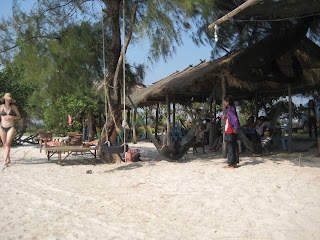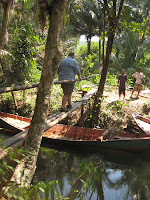
I've been off on my travels again this week, a non stop tour of Wales, Cheshire, Oxfordshire and Reading. It was a great opportunity to catch up with old and new friends who all showed me great hospitality.
First stop was near Whitchurch with Linda and Brian who in the dim and distant past shared damp and grotty lodgings with me when at college. Linda was an AMBA and Brian completed a HND agriculture. After spending 10 years tractor driving they set up their own business with a digger and a little tractor building patios, horse rings, fencng and maintaining suermarket grounds. When their 3 girls were young Linda started as a child minder and now has a constant stream of children clients. Brian has a simple business plan, not going over the VAT limit (making 20% cheaper the other contractors), doing most of the work himself, not employing anybody and working very hard. Since he started he has never been short of work and together they have renovated an old farmhouse and have a smallholding of 6 acres where the children have ponies, ducks and chickens, they fatten a few pigs, sell some silage and have an enviable veg garden.
Af
 ter meeting with fellow Nuffield Scholar Michael and buying a map we travelled to Pwllheli to visit Rhys, a grazing evangalist who runs a herd of 1000 cows. It just so happens that Rhys is also writing a nuffield report on Equity partnerships. Rhys farms in a share farm arrangement that is popular in New Zealand where the land owner takes a share of the risk and the milker has access to capital and borrowing. The key to Rhys system seemed to be the trust between the partners in the share arrangement and he seems to have found the right opportunity to use his attention to detail to produce some pretty impressive results. Michael is writing a grazing blog all about grass so if you are really interested I am sure he will write at length about our visit.
ter meeting with fellow Nuffield Scholar Michael and buying a map we travelled to Pwllheli to visit Rhys, a grazing evangalist who runs a herd of 1000 cows. It just so happens that Rhys is also writing a nuffield report on Equity partnerships. Rhys farms in a share farm arrangement that is popular in New Zealand where the land owner takes a share of the risk and the milker has access to capital and borrowing. The key to Rhys system seemed to be the trust between the partners in the share arrangement and he seems to have found the right opportunity to use his attention to detail to produce some pretty impressive results. Michael is writing a grazing blog all about grass so if you are really interested I am sure he will write at length about our visit.Next stop was Snowdon where Arwyn is farm manager for the National Trust on a farm that has much history and has a wild untamed beauty. Here farming i
 s not just about the results but also about the local community and the environment, relying on subsidy payment to stay in profit, but providing employment to a team of skilled shepherds and farm workers. Arwyn heads and guides this team maintaining a landscape that people care passionately about.
s not just about the results but also about the local community and the environment, relying on subsidy payment to stay in profit, but providing employment to a team of skilled shepherds and farm workers. Arwyn heads and guides this team maintaining a landscape that people care passionately about.After a brief stop at Chestnut meats where Marnie the goat lady fed us goat sausages, I visited another old college friend Mr Nurse. David is a first generation farmer who always wanted to milk cows, when his precollege boss wanted to retire he was offered the opportunity to become the tenant of 125 acres of prime Cheshire farmland. Buying the landlords 100 cows and equipment and taking on huge borrowings David has worked hard to pay back much of what he owed and has m
 ade a profit even in years when the milk price has poor. Again the system is nothing complicated, but by sheer determination and commitment it has worked. David works on his own, with occasonal partime help and a relief milker once a month. If you have milked cows or worked on a farm you will understand the strength of character this requires and I admire all David has achieved. David's lucky break has been belonging to a local co-op of dairy farmers that his landlord had been a founder member. This co-op uses its buying power to negiotiate feed and fertilizer prices, has regular bench marking amongst the members, farm walks and visits and even gives access to small loans for capital improvements.
ade a profit even in years when the milk price has poor. Again the system is nothing complicated, but by sheer determination and commitment it has worked. David works on his own, with occasonal partime help and a relief milker once a month. If you have milked cows or worked on a farm you will understand the strength of character this requires and I admire all David has achieved. David's lucky break has been belonging to a local co-op of dairy farmers that his landlord had been a founder member. This co-op uses its buying power to negiotiate feed and fertilizer prices, has regular bench marking amongst the members, farm walks and visits and even gives access to small loans for capital improvements.After a brief stop in Oxfordshire to cuddle my beautiful new Nephew, I meet with George Dunn of the Tenants Farmers Association (TFA). The TFA was formed in 1981 by a group of farmers who felt that their interests were not being forcefully represented by existing bodies. The TFA is the only organisation dedicated to the agricultural tenanted sector and is the authentic voice on behalf of tenant farmers. The TFA lobbies at all levels of Government and gives professional advice to its members.
So then back to Devon where Nevil and the children have been getting ready for Open Farm Sunday. This mainly envolves Nevil and Elsa tidying up and the rest getting very excited about the opportunity to show people 'Their Farm'.
 So a tour of different farms with one thing in common team work. The husband wife team, the business partnership, the mentoring support of a co-op, the help of a support organisation or the crazy family team I love so much at home. Maybe this could be one of the keys to a successful farm and business. I have a feeling that at last I am finding something to put in my Nuffield report!
So a tour of different farms with one thing in common team work. The husband wife team, the business partnership, the mentoring support of a co-op, the help of a support organisation or the crazy family team I love so much at home. Maybe this could be one of the keys to a successful farm and business. I have a feeling that at last I am finding something to put in my Nuffield report!








































